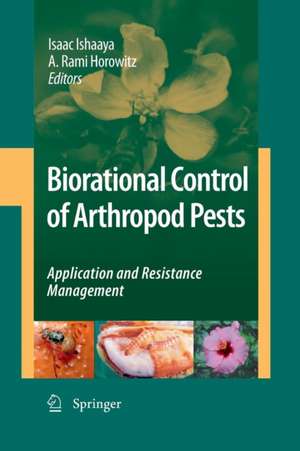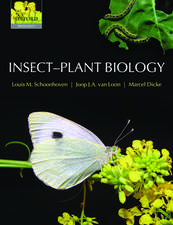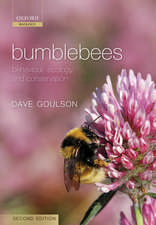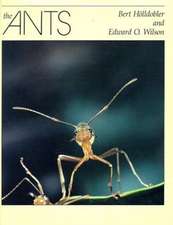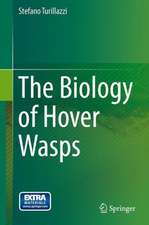Biorational Control of Arthropod Pests: Application and Resistance Management
Editat de Isaac Ishaaya, A. Rami Horowitzen Limba Engleză Paperback – 2 noi 2014
| Toate formatele și edițiile | Preț | Express |
|---|---|---|
| Paperback (1) | 1222.80 lei 6-8 săpt. | |
| SPRINGER NETHERLANDS – 2 noi 2014 | 1222.80 lei 6-8 săpt. | |
| Hardback (1) | 1228.96 lei 6-8 săpt. | |
| SPRINGER NETHERLANDS – 21 sep 2009 | 1228.96 lei 6-8 săpt. |
Preț: 1222.80 lei
Preț vechi: 1491.22 lei
-18% Nou
Puncte Express: 1834
Preț estimativ în valută:
233.98€ • 244.29$ • 193.65£
233.98€ • 244.29$ • 193.65£
Carte tipărită la comandă
Livrare economică 04-18 aprilie
Preluare comenzi: 021 569.72.76
Specificații
ISBN-13: 9789400791688
ISBN-10: 9400791682
Pagini: 420
Ilustrații: XI, 408 p.
Dimensiuni: 155 x 235 x 22 mm
Greutate: 0.59 kg
Ediția:2009
Editura: SPRINGER NETHERLANDS
Colecția Springer
Locul publicării:Dordrecht, Netherlands
ISBN-10: 9400791682
Pagini: 420
Ilustrații: XI, 408 p.
Dimensiuni: 155 x 235 x 22 mm
Greutate: 0.59 kg
Ediția:2009
Editura: SPRINGER NETHERLANDS
Colecția Springer
Locul publicării:Dordrecht, Netherlands
Public țintă
ResearchCuprins
Biorational Pest Control – An Overview.- Agonists/Antagonists of the Insect Kinin and Pyrokinin/PBAN Neuropeptide Classes as Tools for Rational Pest Control.- Rational Design of Insect Control Agents: The PK/PBAN Family as a Study Case.- Tyramine and Octopamine Receptors as a Source of Biorational Insecticides.- Recent Advances in the Mode of Action of Juvenile Hormones and Their Analogs.- ?-Aminobutyric Acid Receptors: A Rationale for Developing Selective Insect Pest Control Chemicals.- Natural Products: Plant Lectins as Important Tools in Controlling Pest Insects.- Genetically Modified Insects as a Tool for Biorational Control.- Symbiosis Research as a Novel Strategy for Insect Pest Control.- Novel Approaches for the Management of Mealybug Pests.- Manipulation of Insect Signaling for Monitoring and Control of Pest Insects.- Physical Control: An Important Tool in Pest Management Programs.- A Systems Approach to IPM Integration, Ecological Assessment and Resistance Management in Tree Fruit Orchards.- Mechanisms of Acaricide Resistance in the Two-Spotted Spider Mite Tetranychus urticae.
Textul de pe ultima copertă
Among the highlights of this book are the use of selective control agents acting on specific biochemical sites such as neuropeptides, ecdysteroids and juvenile hormone analogs; GABA, ACh, ryanodine and octopamine receptors; pheromone and insect communication disruption along with plant constituents for selectively controlling arthropod pests. Novel biotechnology strategies that exploit genetically modified plants, insects, and symbionts for the management of insect pests and disease-borne vectors are presented. Furthermore, physical control techniques can serve as important tools to protect our crops from arthropod pests. Finally, countermeasures for resistance to biorational control agents using advanced biological and biochemical approaches are also discussed.
Caracteristici
Our book based on environmentally friendly approaches for controlling arthropod pests along with resistance management programs such as: Neuropeptide agonists and antagonists as rational pest control agents Tyramine and octopamine receptors as a source for rational insecticides Ecdysone and juvenile hormone analogues as a source for selective insecticides Genetically modified insects as a tool for rational control Behavioural approaches for controlling insect pests such as genetically modified insects, symbiosis and male/female call disturbance Natural products as a source for rational insecticides Transgenic approaches aiming at developing crops resistant to insect pests Resistance management programs aiming at lessening resistance development to novel insecticides
